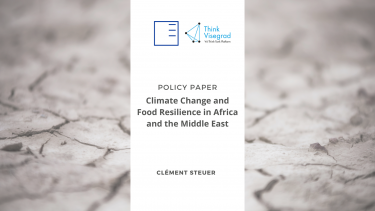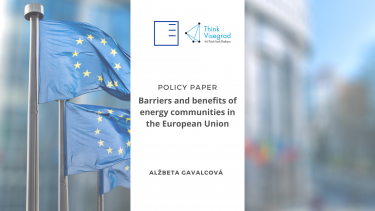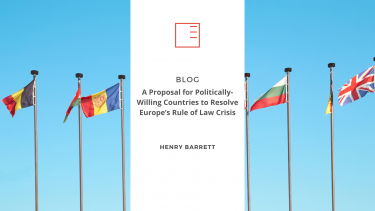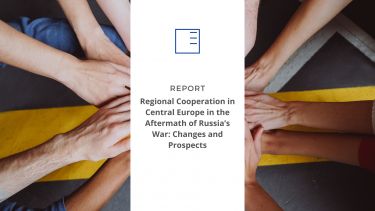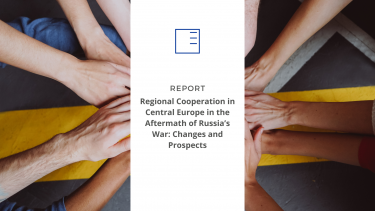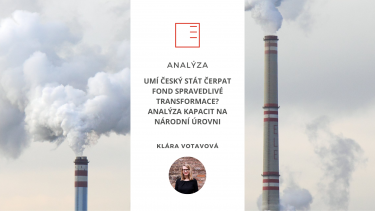Policy Paper | Climate Change and Food Resilience in Africa and the Middle East
Russia's war in Ukraine has destabilised supply chains and strained food systems in Africa and the Middle East, highlighting their vulnerability and the need to increase their resilience. Writes Clément Steuer, Senior Research Fellow at the Institute of International Relations Prague.
Zjistit vícePolicy Paper | Climate Change and Food Resilience in Africa and the Middle East
Ruská válka na Ukrajině destabilizovala dodavatelský řetězec a zatížila potravinové systémy Afriky a Blízkého východu, což zdůraznilo jejich zranitelnost a potřebu zvýšit jejich odolnost. Píše Clément Steuer, seniorní výzkumník v Ústavu pro mezinárodní vztahy v Praze.
Zjistit vícePolicy Paper | Barriers and benefits of energy communities in the European Union
Energy communities are an effective means to decentralize and renew our energy systems with sustainable solutions as they are usually based on renewable energy. They have already started emerging in 1970´s, yet there has been a significant increase in their development only in recent years, also in terms of their introduction into the EU legislation. Especially in Western and Northern European countries the concept already enjoys vast popularity. On the other hand, in Central and Eastern European countries (further referred to as CEE) energy communities are only beginning to emerge. The policy brief (based on literature and interviews with various stakeholders ) examines the benefits energy communities may bring, and more importantly, the main obstacles remaining in their way for greater evolution in the CEE region – and especially Visegrad countries (V4). As these initiatives progress, sharing the best practices will ensure the success of the community energy in the energy transition. Writes Alžbeta Gavalcová.
Zjistit vícePolicy Paper | Barriers and benefits of energy communities in the European Union
Energetické komunity jsou účinným prostředkem decentralizace a obnovy našich energetických systémů pomocí udržitelných řešení, protože jsou obvykle založeny na obnovitelné energii. Začaly se objevovat již v 70. letech 20. století, avšak k jejich výraznému rozvoji došlo až v posledních letech, a to i z hlediska jejich zavedení do legislativy EU. Zejména v zemích západní a severní Evropy se tato koncepce již těší velké oblibě. Naproti tomu v zemích střední a východní Evropy (dále jen SVE) se energetická společenství teprve začínají vytvářet. Tento politický brief (založený na literatuře a rozhovorech s různými zúčastněnými stranami ) zkoumá výhody, které mohou energetická společenství přinést, a především hlavní překážky, které jim stále stojí v cestě k většímu rozvoji v regionu střední a východní Evropy - a zejména v zemích Visegrádské skupiny (V4). Jak tyto iniciativy postupují, sdílení osvědčených postupů zajistí úspěch komunitní energetiky v energetickém přechodu. Píše Alžbeta Gavalcová.
Zjistit víceBLOG | A Proposal for Politically-Willing Countries to Resolve Europe’s Rule of Law Crisis
Given the lack of adequate EU responses over rule of law violations, politically-willing European states ought to consider a novel accountability mechanism. It is high time for committed European states to take innovative and decisive action on more than a decade of democratic backsliding sweeping the region and the world. Should European Union Member States concerned about rule of law violations seek a solution outside the EU institutions? Our researcher Henry Barrett, a Fulbright-Schuman Grantee, writes about this topic in his blog.
Zjistit víceBLOG | Jak vyřešit krizi právního státu v Evropě?
Vzhledem k nedostatečné reakci EU na porušování zásad právního státu by evropské státy, které k tomu mají politické důvody, měly zvážit zavedení nového mechanismu odpovědnosti. Je nejvyšší čas, aby evropské státy přijaly inovativní a rozhodné kroky v souvislosti s více než desetiletým úpadkem demokracie, který zasáhl nejen Evropu, ale i celý svět. Měly by členské státy Evropské unie, znepokojené porušováním zásad právního státu, hledat řešení mimo orgány EU? O tématu píše ve svém blogu náš výzkumník v rámci Fulbright-Schumanova grantu Henry Barrett.
Zjistit víceReport | Regional Cooperation in Central Europe in the Aftermath of Russia’s War: Changes and Prospects
On April 18th, EUROPEUM’s Brussels Office in partnership with PISM Brussels Office under the Think Visegrad platform hosted a discussion titled “Regional Cooperation in Central Europe in the Aftermath of Russia’s War: Changes and Prospects”. This event was attended by 15 experts from think tanks and representatives of EU institutions.
Zjistit víceReport | Regional Cooperation in Central Europe in the Aftermath of Russia’s War: Changes and Prospects
Dne 18. dubna 2024 uspořádala bruselská kancelář Institutu EUROPEUM ve spolupráci s bruselskou kanceláří Polského institutu mezinárodních vztahů (PISM) v rámci platformy Think Visegrad diskusi s názvem "Regionální spolupráce ve střední Evropě po válce s Ruskem: změny a vyhlídky". Této akce se zúčastnilo 15 odborníků z think tanků a zástupců institucí EU.
Zjistit víceAnalysis | Can the Czech state distribute the just transition fund? Analysis of its capacities at the national level
The aim of this research report is to determine, through interviews with officials and other relevant stakeholders, whether the Czech public administration has sufficient capacity and organisational capability to effectively draw down funds from the Just Transition Fund. The author of the publication is Klára Votavová, researcher at EUROPEUM Institute.
Zjistit více PDFAnalýza | Umí český stát čerpat fond spravedlivé transformace? Analýza kapacit na národní úrovni
Cílem této výzkumné zprávy je na základě rozhovorů s úředníky a dalšími relevantními stakeholdery zjistit, zda má česká státní správa dostatečné kapacity a organizační schopnosti, aby efektivně čerpala finanční prostředky z Fondu spravedlivé transformace. Autorkou publikace je Klára Votavová, výzkumná pracovnice Institutu EUROPEUM.
Zjistit více PDFStaroměstské náměstí 4/1
Praha 1 - Staré Město
110 00
tel.: +420 212 246 552
email: europeum@europeum.org
https://www.europeum.org
